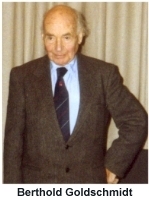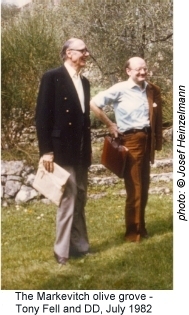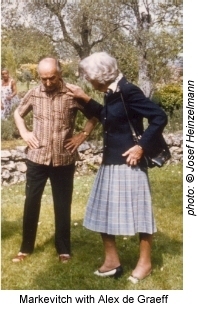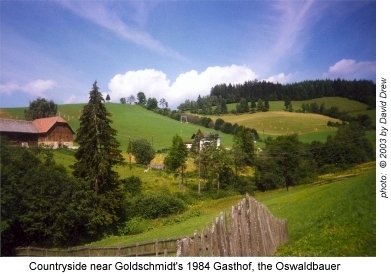|
January: At the
suggestion of the composer David Matthews, attends the run-through of
scenes from Berthold Goldschmidt's opera Der gewaltige Hahnrei
(1930), mounted by Trinity College of Music in London in honour of the 80th
birthday of the then almost totally neglected composer. Astonished by the
theatrical impact of an opera unheard and unseen since its successful first
production (Mannheim, 1931), Drew attempts to promote the work to his
colleagues on the advisory board of the New Opera Company, as a farewell
production before the NOC is finally absorbed by English National Opera; the
suggested conductor, and an admirer of Goldschmidt, is Simon Rattle. Although
the idea itself comes to nothing - the NOC will die without a swan-song -
Der gewaltige Hahnrei (The Mighty Cuckold) and its further promotion
become the subjects of Drew's first discussions with the composer.
7 March: The
unexpected death of Markevitch in Antibes at the age of 71 - immediately
following his return from a successful tour of the USSR - puts an immediate
stop to what would have been the culminating event in the already
internationally successful propagation of his music during the past three
years: the commercial recording by the new Sony label of his oratorio after
Milton, Le Paradis perdu.
"Spinner, 'Die Reihe', and
Thematicism - Notes towards a thirteenth question" published in
Tempo. Spinner (see 1972) had died in 1980. Through the intermediacy of
Gottfried von Einem, D plays an active part in the negotiations and
arrangements for the transfer of the entire Spinner Nachlass to the
music collection of the Vienna City Library.
October: From Vienna
(discussions with von Einem, chiefly about Spinner) to Mürzzuschag,
the birthplace of Brahms's Fourth Symphony and now the centre of the
Mürz Valley Workshop, a festival of contemporary arts founded in
1981 as a collaboration between local musicians, the Walter Buchebner Society,
and Hans Werner Henze (whose own experiments at Montepulciano had
provided a model). Henze and the Mürz Valley team have now parted company.
D is invited by Robert Lotter, the Director of the Festival and
president of the Society, to join the programme committee - of which he will
remain an active member for the next six years.
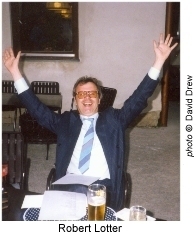
2-5 November: New
Haven, Connecticut, first international conference on Kurt Weill -
sponsored jointly by the John Herrick Jackson Music Library at Yale University
and the Kurt Weill Foundation for Music (President: Kim Kowalke). One of
the guests of honour is Goldschmidt, on his first-ever visit to the USA.
At the conference, Drew delivers a paper on Weill's operetta Der
Kuhhandel. Companions on the flight from London, Goldschmidt and Drew
together attend the official opening of the Weill-Lenya archive in New York
(Director and Archivist, David Farneth). Also present is the young
British musician and theatre-composer Matthew Scott, who since 1982 has
been working with D on a doctoral thesis for City University, London,
provisionally entitled 'Towards an American opera form' and examining the
complete cycle of Weill's works for the American stage. Scott is commissioned
by Patrick Carnegy of Faber & Faber to copy-edit the biographical
chapters of D's LIFE & WORKS.
27 November: Premiere
in Stuttgart - as opening production in the small auditorium designed by James
Stirling - of Kurt Schwertsik's opera for young audiences,
Fanferliesschen. Discussions with the director and designer Axel
Manthey. Schwertsik and D will subsequently prepare the English-language
version, Fanferlizzy.
Year-end: Tony
Fell and D have now secured for B&H most of the unpublished works of
Roberto Gerhard (including The Duenna), together with most of the
works published in the UK prior to 1960. The (West-)German composer York
Höller has joined B&H.
|
